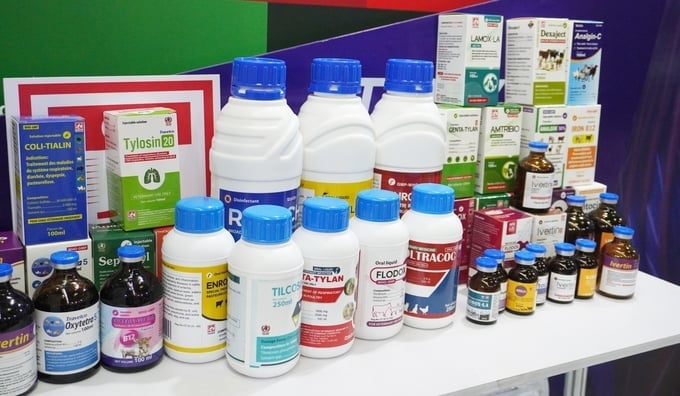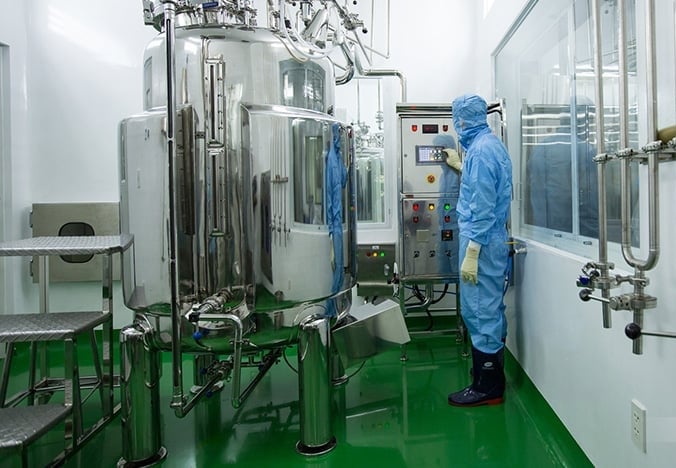December 11, 2025 | 02:16 GMT +7
December 11, 2025 | 02:16 GMT +7
Hotline: 0913.378.918
December 11, 2025 | 02:16 GMT +7
Hotline: 0913.378.918
The Government Office recently issued Document No. 1607/VPCP-NN on March 12, which was addressed to the Ministry of Agriculture and Rural Development, the Ministry of Science and Technology, and the Ministry of Justice. The Document detailed the comments of Deputy Prime Minister Tran Luu Quang regarding the proposal concerning deficiencies in veterinary medicine registration procedures.
The Vietnam Veterinary Pharmaceutical Association (VPPA) submitted Document No. 06/02/CV/HH dated February 6, 2024 to the Prime Minister, proposing improvements to the veterinary medicine registration procedures.
In response, Deputy Prime Minister Tran Luu Quang commented: The Ministry of Agriculture and Rural Development will be the primary facilitator in coordinating with the Ministry of Science and Technology, the Ministry of Justice, and relevant agencies to study the proposal of VPPA as stated in the aforementioned document.
Furthermore, these parties must promptly implement the tasks outlined in Document No. 1195/VPCP-KSTT, which was issued by the Government Office February on 24. The results of this task must be reported to the Prime Minister before March 30.

The Vietnam Veterinary Pharmaceutical Association believes that the registration procedures for veterinary medicines is unnecessary. Photo: Hong Tham.
According to Document No. 1195/VPCP-KSTT dated February 24, Deputy Prime Minister and Head of the Administrative Procedure Reform Task Force under the Prime Minister requested the Ministry of Agriculture and Rural Development to coordinate with the Ministry of Science and Technology in studying solutions to the challenges faced by businesses in establishing a suitable management mechanism for veterinary medicines, streamlining administrative procedures, reducing costs for the community, promoting livestock development, and preventing disruptions to production and business activities. The results of this task must be reported to the Prime Minister before March 30.
According to a previous proposal made by VPPA, pursuant to the 2015 Law on Veterinary, veterinary medicine is regulated through the control of production conditions and a certificate of good manufacturing practices (GMP), with the WHO-GMP and EU-GMP standards being the most dominant. Additionally, veterinary medicine quality control is conducted in accordance with technical standards prior to production and circulation, which will be indicated by a certificate of veterinary medicine registration.
In order to be certified as GMP-compliant, businesses must satisfy a strict range of conditions regarding location, infrastructure, equipment, personnel, storage facilities, preservation, and production materials.
The registration procedure for circulation is also complex, involving multiple stages of research, examination, evaluation, and testing.
The registration dossier includes numerous documents proving that the veterinary medicine product meets technical standards. Subsequently, medicine quality control is conducted based on technical standards issued by the Ministry of Agriculture and Rural Development.
The result sheet issued by the designated testing agency will indicate that the veterinary medicine products comply with the quality requirements QCVN 01-187:2018/BNNPTNT. Products granted registration for circulation will also be regarded as meeting the technical standards.
However, according to Article 4, Clause 9 and Article 48, Clause 1 under the current Law on Standards and Technical Regulations, businesses engaged in the manufacturing and trading of veterinary medicines must also carry out additional procedures for compliance declaration.
Veterinary medicines are managed in accordance with the standards outlined in the Law on Veterinary, and confirmed through the circulation registration process. The registration dossier also includes documents related to compliance declaration.
Consequently, the implementation of an additional compliance declaration procedure for veterinary medicine products is unnecessary, resulting in redundancy, management overlap, inefficiencies in time utilization., and increased expenses for both governmental agencies and businesses.
Furthermore, according to the regulations on medicine circulation under the 2016 Law on Pharmacy, pharmaceuticals for human use only require circulation registration procedures without the need for compliance declaration procedures.

Pursuant to the 2015 Law on Veterinary, veterinary medicine is regulated through the control of production conditions and a certificate of good manufacturing practices - GMP. Photo: HT.
With regards to products classified as dietary supplements and food for humans, the level of quality control under the jurisdiction of the Ministry of Health is not as stringent as pharmaceutical management under the Law on Pharmacy. Compliance declaration was previously required as per Decree No. 38/2012/ND-CP dated April 25, 2012. However, the amended Decree No. 15/2018/ND-CP dated February 2, 2018 removed said procedures.
Furthermore, many countries around the world do not require compliance declaration for veterinary medicines. Veterinary medicines manufactured in Vietnam for export to other countries are not required to bear compliance markings. Alternatively, they only need to meet GMP standards.
Consequently, the VPPA, which represents Vietnamese veterinary medicine manufacturing and trading businesses, proposed the Prime Minister to consider amending the Law on Standards and Technical Regulations accordingly.
Prior to such changes, the VPPA proposed a temporary suspension of compliance declaration procedures for veterinary medicines.
Translated by Nguyen Hai Long
![Unlocking carbon credit potential: [2] Story of Pu Hu forest](https://t.ex-cdn.com/nongnghiepmoitruong.vn/608w/files/huyenvt (e)/2025/12/09/3813-2-171042_611.jpg)
(VAN) Revenue from emission reductions has brought major changes to the Pu Hu Nature Reserve, from improving community livelihoods to strengthening linkages for sustainable forest management.
![Unlocking carbon credit potential: [1] Toward a green economy](https://t.ex-cdn.com/nongnghiepmoitruong.vn/608w/files/huyenvt (e)/2025/12/09/1340-2-130237_804.jpg)
(VAN) Thanh Hoa is advancing the development of carbon credits from forests and agriculture, generating sustainable income, improving livelihoods, and moving toward a green and low-emission economy.

(VAN) After three years, Project FST/2020/123 collected approximately 3,000 insect specimens, classified them into about 50 morphological groups, and identified around 40 species, including several new species.
/2025/12/01/0509-2-175427_206.jpg)
(VAN) Emission-reducing coffee areas in Lam Dong have entered the new crop with stable yields, improved quality, and a remarkably enhanced cultivation environment.

(VAN) The Institute of Agricultural Sciences for Southern Vietnam (IAS) marked its 100th anniversary in Ho Chi Minh City, celebrating a century of growth as a leading institute contributing significantly to Viet Nam’s agricultural development.

(VAN) An increasing number of livestock farms are using biogas generators to create a source of renewable electricity, helping to save costs and mitigate environmental pollution.

(VAN) Small changes in rice cultivation, from irrigation methods and straw collection to input management, are paving a new way for Vietnam's agriculture in the journey toward emission reduction.